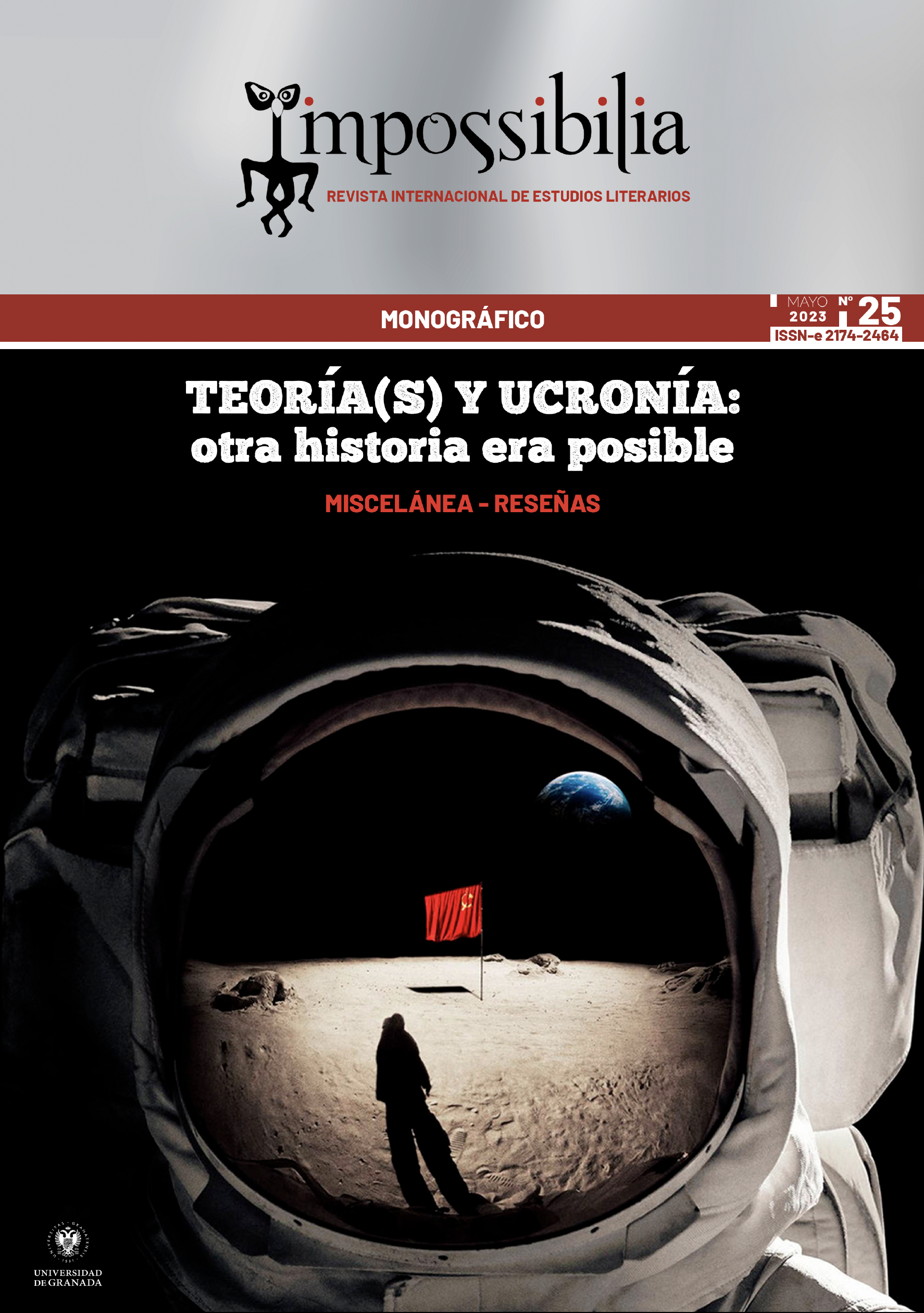"Peace for our Time": a Uchronian Approach to British Fascism in Jo Walton’s "Farthing"
DOI:
https://doi.org/10.30827/impossibilia.252023.27127Palabras clave:
Uchronia, counterfactuals, fascism, antisemitism, peace, Ucronía, contrafácticos, fascismo, antisemitismo, pazResumen
Este artículo parte de un marco ucrónico para analizar Farthing (2006) de Jo Walton, una obra que se centra en una Gran Bretaña alohistórica en los años posteriores a la firma de un tratado de paz con la Alemania nazi. Este estudio tratará de fusionar el discurso histórico de un periodo que es testigo del surgimiento del fascismo en el país con la propuesta ucrónica que plantea la novela y que trae como consecuencia el nombramiento de un militante fascista como primer ministro y el estallido de una violenta corriente antisemita. El análisis de esta novela parte de las teorías de críticos e historiadores como Amy Ramson, Karen Hellekson, Richard Thurlow o Nigel Copsey, entre otros, cuyos trabajos contribuyen a trazar interesantes paralelismos entre la historia que conocemos y el mundo contrafáctico que recrea Walton
Descargas
Citas
BALDOLI, Claudia. (2004). Anglo-Italian Fascist Solidarity?: The Shift from Italophilia to Naziphilia in the BUF. In Gottlieb, Julie and Linehan, Thomas (Eds.), The Culture of Fascism: Visions of the Far-Right in Britain (pp. 147-161). London & New York: Tauris.
BLAND, Benjamin. (2019). Holocaust inversion, anti-Zionism and British Neo-fascism: the Israel–Palestine Conflict and the Extreme Right in Post-war Britain. Patterns of Prejudice, (53)1, 86-97.
CARR, E.H. (1961). What is History? London: Penguin.
COPSEY, Nigel. (2008). Contemporary British Fascism: The British National Party and the Quest for Legitimacy. Hampshire and New York: Palgrave Macmillan.
COWLEY, Robert. (Ed). (2001). More What If? Military Historians Imagine What Might Have Been. London: Pan Books.
FERGUSSON, Niall. (Ed). (2003). Virtual History: Alternatives and Counterfactuals. London: Pan Books.
HALL III, Hines H. (1976). The Foreign Policy-Making Process in Britain, 1934-1935, and the Origins of the Anglo-German Naval Agreement. The Historical Journal, (19)2, 477-499.
HANDWERK, Brian. (2016). Will We ever Know why Nazi Leader Rudolf Hess Flew to Scotland in the Middle of World War II? https://bit.ly/3vtQ0V3.
HARDESTY, William H. (2003). Toward a Theory of Alternate History: Some Versions of Alternate Nazis. In Chapman, Edward L. (Ed.), Classic and iconoclastic alternate history science fiction (pp. 71-92). Lewiston, NY; Lampeter: Mellen P.
HELLEKSON, Karen. (2000). Toward a Taxonomy of the Alternate History Genre. Extrapolation, (41)3, 248-256.
HILLIARD, Christopher. (2016). Words that Disturb the State: Hate Speech and the Lessons of Fascism in Britain, 1930s–1960s. The Journal of Modern History, (88)4, 764-796.
HOERBER, Thomas. (2009). Psychology and Reasoning in the Anglo-German Naval Agreement, 1935-1939. The Historical Journal, (52)1, 153-174.
KLEIN, Christopher. (2020). Chamberlain declares “Peace of our Time”. https://bit.ly/3VM22nu.
LeCRAS, Luke. (2018). ‘Europe a Nation’ or ‘Common Market Suicide’? Fascism, European Entanglement and the Ideology of Britain’s Extreme Right, 1945-75. Australian Journal of Politics and History, (64)3, 436-449.
MESSENGER, Charles. (2002). The Battle of Britain, 1940: the Triumph of the Luftwaffe. In Tsouras, Peter G. (Ed.), Third World Victorious: Alternate Decisions of World War II (65-96). London: Greenhill Books.
RANSOM, Amy J. (2003). Alternate History and Uchronia: Some Questions of Terminology and Genre. Foundation. The International Review of Science Fiction, (32)87, 58-72.
ROSENFELD, Gavriel. (2002). Why do we Ask “What If?”: Reflections on the Function of Alternate History. History and Theory, 41, 90-103.
SCHMUNK, Robert. (2022). Uchronia. http://www.uchronia.net/intro.html.
THOMPSON, E.P. (1978). The Poverty of Theory and other Essays. London: Merlin.
THURLOW, Richard. (1998). Fascism in Britain: from Oswald’s Mosley’s Blackshirts to the National Front. London and New York: Tauris.
THURLOW, Richard. (2004). The Developing British Fascist Interpretation of Race, Culture and Evolution. In Gottlieb, Julie and Linehan, Thomas (Eds.), The Culture of Fascism: Visions of the Far-Right in Britain. (66-82). London & New York: Tauris.
WALTON, Jo. (2006). Farthing [e-book]
Descargas
Publicado
Cómo citar
Número
Sección
Licencia
Derechos de autor 2023 Impossibilia. Revista Internacional de Estudios Literarios

Esta obra está bajo una licencia internacional Creative Commons Atribución-NoComercial-SinDerivadas 4.0.



















